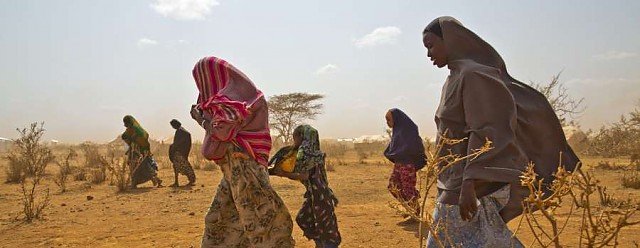Home > What We Do > Environment and Climate Change
Environment and Climate Change

Far-Reaching Global Implications
Few issues have such far-reaching global implications as climate change and the environment, with major significance for the work of UNHCR and the millions of forcibly uprooted people around the world.
The environment is important because many people of concern to UNHCR rely on it for survival - particularly during emergencies - for their food, shelter, energy, fire and warmth, medicine, agriculture, income-generation activities and more. Unsustainable use of natural resources can lead to environmental degradation, with lasting impacts on natural resources and on the well-being of the displaced and host communities. Competition over scarce natural resources such as firewood, water and grazing land, can lead to animosity and friction.
Since the 1990s, UNHCR has become increasingly committed to protecting the environment and increasingly aware of the environmental challenges associated with hosting a large population in a small area. In the ensuing decades, UNHCR has set in place programmes and initiatives aimed at improving sustainable environmental management in order to reduce environmental degradation and enhance the resources available to refugees and internally displaced people as well as host communities.
Climate change is a growing concern for the UN refugee agency. In 2013, 22 million people were displaced by disasters brought on by natural hazard events. The Intergovernmental Panel on Climate Change, the UN's science advisory board, projects an increase in the number of displaced over the course of this century. The majority of the people of concern to UNHCR are concentrated in least developed countries, which are climate change hotspots around the world. Climate change will force people into increasing poverty and displacement, exacerbating the factors that lead to conflict, rendering both the humanitarian needs and responses in such situations even more complex.
UNHCR is deeply concerned about the massive protection challenges raised by climate-related related displacement. UNHCR is working within an inter-agency context with a range of partners, especially members of the Advisory Group on Climate Change and Human Mobility, and with the Nansen Initiative on cross-border displacement in the context of disasters linked to natural hazards to ensure that protection gets the requisite attention, including in disaster responses, not just conceptually but also, most importantly, operationally.
Climate Change
The earth's climate is changing, and that concerns us as it could lead to displacement.
Sustainable Environmental Management
A policy priority relevant in all our work.
Energy
Access to safe and sustainable energy is a basic need for everyone











